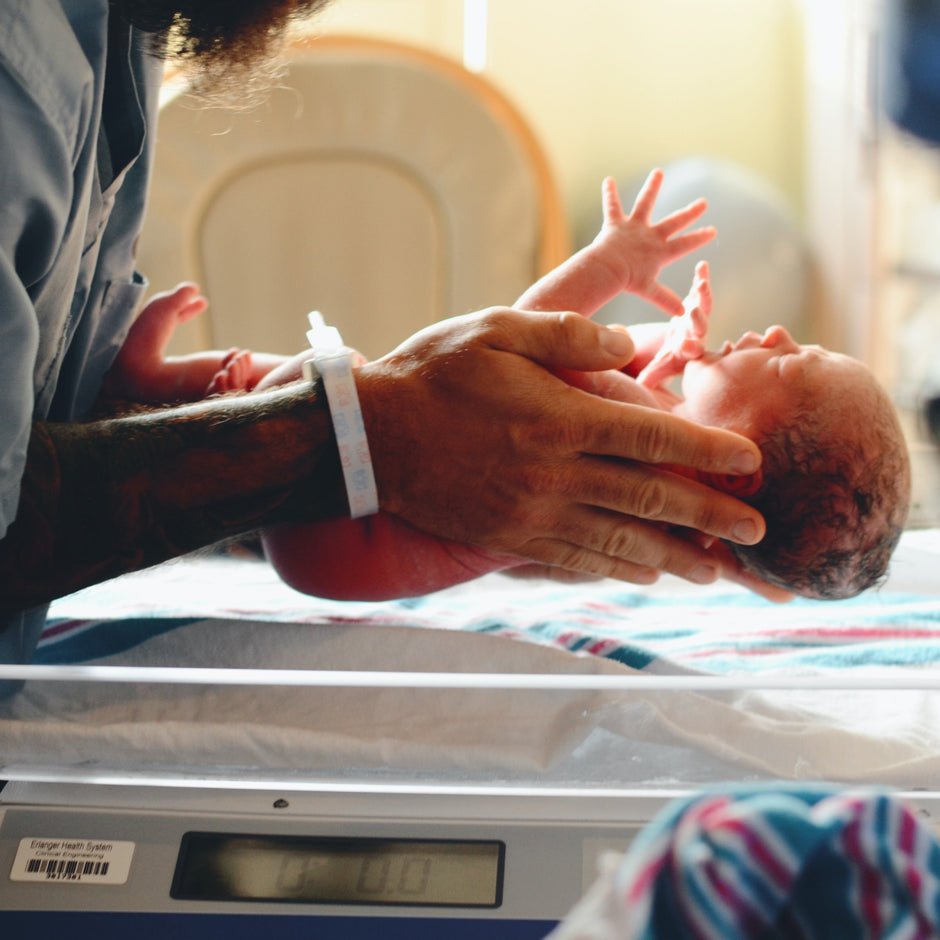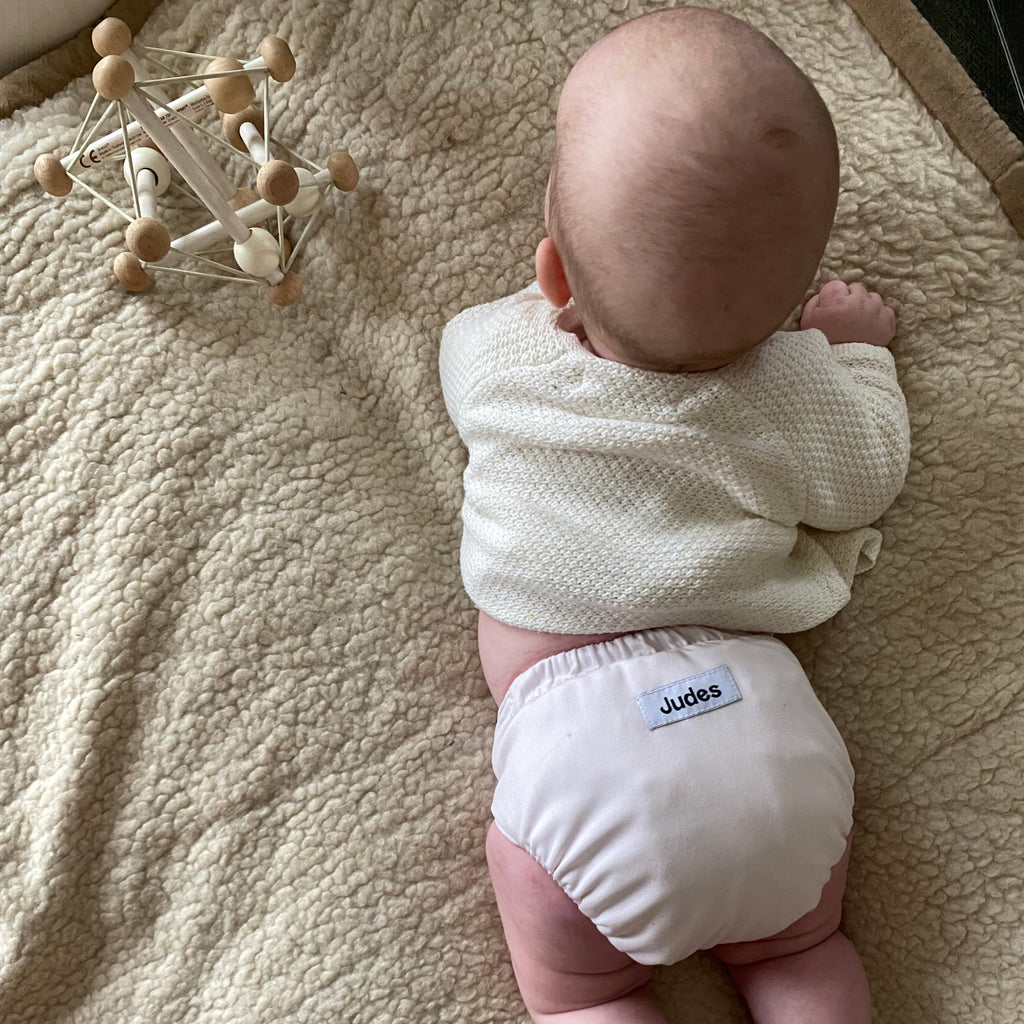Proper Diapering for Meconium: Everything You Need to Know about Baby's First Stool
Updated on:
Photo by Khoa Pham on Unsplash
As new parents, we learn alongside our baby. Never before have we held our own child in our arms and never before have we felt such a great responsibility. This feeling is both frightening and wonderful. The better we understand the processes occurring in our child's body, the more secure we feel.
But in the beginning, everything is new. No matter how well you've prepared, there will be thousands of things you haven't considered. A major topic is bowel movements.
A look inside the diaper is revealing – we find important clues about the baby's health in the urine and stool. But the first stool can be confusing: In this blog, we explain what's going on with this tar-like stool.

Photo by @kerstinbrigitteposch
What is Meconium?
The word Meconium refers to the first bowel movement of a newborn. It has a greenish to black color and looks like tar due to its thick and sticky consistency. This has given meconium the colloquial name "baby's first poop". Unlike tar, however, the excretion is almost odorless.
Those who hear about a baby's first poop for the first time are often very surprised - as was I. It's fascinating how nature has designed this process. Meconium excretes various particles that develop in the amniotic fluid during pregnancy. These include mucus, skin cells, lanugo, and thickened bile.
How Does the Baby's First Poop Form?
The baby's first poop begins to form between the 10th and 14th week of pregnancy. However, the meconium is not expelled since the intestines only really start functioning at birth. At first glance, it makes no sense that a newborn, which has never eaten, would already have a stool.

Photo by Khoa Pham on Unsplash
The reason for this is that the baby drinks amniotic fluid: By regularly sipping, your unborn child is actually training. Although the digestive tract does not function like it will later, it is slowly prepared by swallowing. The fluid normally exits the unborn child as urine, while particles such as skin cells and lanugo accumulate in the intestines.
When Does the Baby's First Poop Occur? And How Much is Normal?
The intestines' first emptying is often triggered by the stress of birth. However, every baby is a little different. Normally, a newborn will pass the baby's first poop 12 to 48 hours after birth. By the fourth day, the meconium should end up in the diaper.
By the way: Breastfeeding helps to promote the passage of the baby's first poop. Nature has set this up incredibly wisely. The first breast milk contains little fat, a lot of protein, and is especially easy to digest.
No Bowel Movement After Birth: When Should I See a Doctor?
Experts generally advise that parents should notify the doctor if the newborn has not had a bowel movement within the first 24 hours after birth. Usually, the cause is harmless, but this can help to rule out any problems such as an intestinal obstruction.
Sometimes, however, the tiny baby surprises the parents with a huge amount of meconium. I can reassure you - this is completely normal and even a good sign that the intestine is doing its job.
Is the Baby's First Poop Dangerous?
No, the excretion of meconium is a natural process and absolutely safe. If the baby's first poop does not occur within the typical timeframe, parents should get it checked out. Various health issues, such as an intestinal obstruction, can block excretion.
However, even if the baby's first poop does not occur, there is no need to worry. It may be that the baby already expelled the meconium in the womb. This can be easily identified by the greenish-cloudy color of the amniotic fluid. Meconium-stained amniotic fluid is relatively common - especially in pregnant women who give birth past their due date.
How Do I Change a Diaper with a Baby's First Poop?
Due to its tar-like consistency, meconium is extremely sticky. The easiest way to remove it from your baby's skin is with a bit of oil on a soft cloth.
If the baby's first poop gets on clothing, it's best to treat the stain immediately. Because of its sticky consistency, it will be harder to wash out later.

Photo by @kerstinbrigitteposch
Judes for Newborns
You can use Judes Family's cloth diapers for your newborn with this little trick: You put on the inner diaper as usual and fasten the Velcro. If the diaper is not tight enough around the legs, you can simply turn the ruffles inward. Finally, the cover goes on as normal.
Still looking for the perfect changing table setup? Find the answers in our blog post.
What Happens if a Baby Swallows Green Amniotic Fluid?
In discussions about meconium, parents sometimes hear about the extremely rare Meconium Aspiration Syndrome. If a newborn swallows green amniotic fluid, there is a danger it could inhale meconium. This can lead to inflammation of the lungs and breathing difficulties—this is known as Meconium Aspiration Syndrome.
What Symptoms Indicate Meconium Aspiration Syndrome?
Thickened and green amniotic fluid, greenish skin, or gasping for air are the first visible symptoms of Meconium Aspiration Syndrome. Medical professionals watch for possible symptoms during birth because MAS can mean acute life-threatening danger.
But: Meconium Aspiration Syndrome is rare! Most newborns who have inhaled meconium become healthy without any complications.
When Does the First Bowel Movement After the Baby's First Poop Appear?
After the baby has expelled the baby's first poop, the next one is the transitional stool, and only then do you get breast milk stool. The transitional stool gradually loses the black color and is often less sticky than before.
The first breast milk stool tends to appear after about a week, which is yellowish and more liquid. However, with babies, the term normal can have a wide range of meanings. That's why midwives often say: "Five times a day or once every five days!"
How Do the Bowel Movements of Breastfed Babies Differ From Those Who are Bottle-fed?
The stool of breastfed babies looks different than that of bottle-fed ones. Breast milk stool is usually a mushy, yellowish-green color and is often very soft or even liquid. Newborns who are exclusively breastfed sometimes have less frequent and less solid stools.

Photo by Kelly Sikkema on Unsplash
The bowel movements of newborns who drink from a bottle are usually more solid and have a brown or yellow color. Unlike the odorless breast milk stool, it often smells more unpleasant.
Every Person is Different, So is Every Newborn
However, new parents should not forget that every body is different. Variations in frequency, consistency, and color of stool are absolutely normal. What's important is that the baby is not in pain and has regular bowel movements. If you're unsure, you should always seek medical advice. Generally, we want to encourage you as a mom and dad to trust your intuition. We parents usually know best how our child is doing.
Are you ready for changing? In this blog post, we show you how much time you can expect diapering with cloth diapers to take you.
Here's Why You Should Keep an Eye on Your Baby's Bowel Movements
It's not just for babies; as adults, we also know how important a healthy digestive system is for overall wellbeing.

Photo by heymattallen from Pixabay
That's exactly why it's important for new parents to engage with their child's bowel movements. Color, frequency, and consistency can vary widely. Whether the baby is breastfed or bottle-fed is also a big factor.
Speaking of bowel movements, we have an overview that shows you how many diapers your child needs per day (at all ages). Read the blog post so that you're well prepared for diaper changes.
Conclusion
New parents unfamiliar with the baby's first poop often get a scare when they see their baby's first bowel movement. But you don't need to worry: Meconium is natural and absolutely not dangerous. The tar-like, black stool is a collection of particles, such as skin cells and lanugo. During pregnancy, the unborn baby took in these very substances with the amniotic fluid. The fluid is excreted as urine but not the particles. This is because the intestines only start working properly at birth. Therefore, the baby's first poop is excreted in the first days after birth.
However, every body is different - many unborn babies already excrete meconium during pregnancy. If this is the case with your baby, you will recognize it by the greenish amniotic fluid. Ask your midwife if you have further questions about the baby's first poop. Complications are rare, but they can happen.
We have so much to learn as new parents. Whether it's about bowel movements, breastfeeding, or crying - uncertainties and worries are normal, especially in the beginning with the first child. That's why it makes sense to engage with the baby's excretions. That way, you know what's happening in your child's gut and you're prepared if something seems unusual at first glance. Usually, it's just part of the normal developmental process of the baby.
Still looking for diapers that have a positive impact on your child's health and are also sustainable? That's precisely why Judes Family exists - we make sustainable diapering as easy as never before and finally suitable for everyday use.

